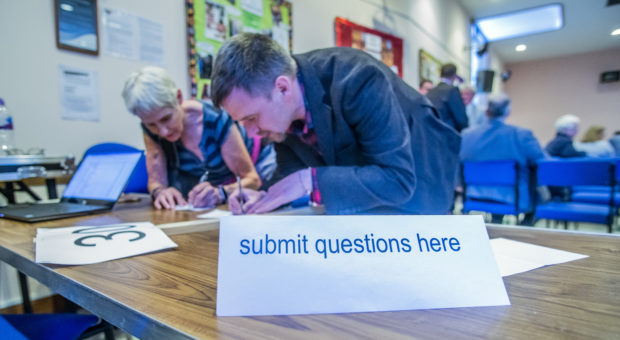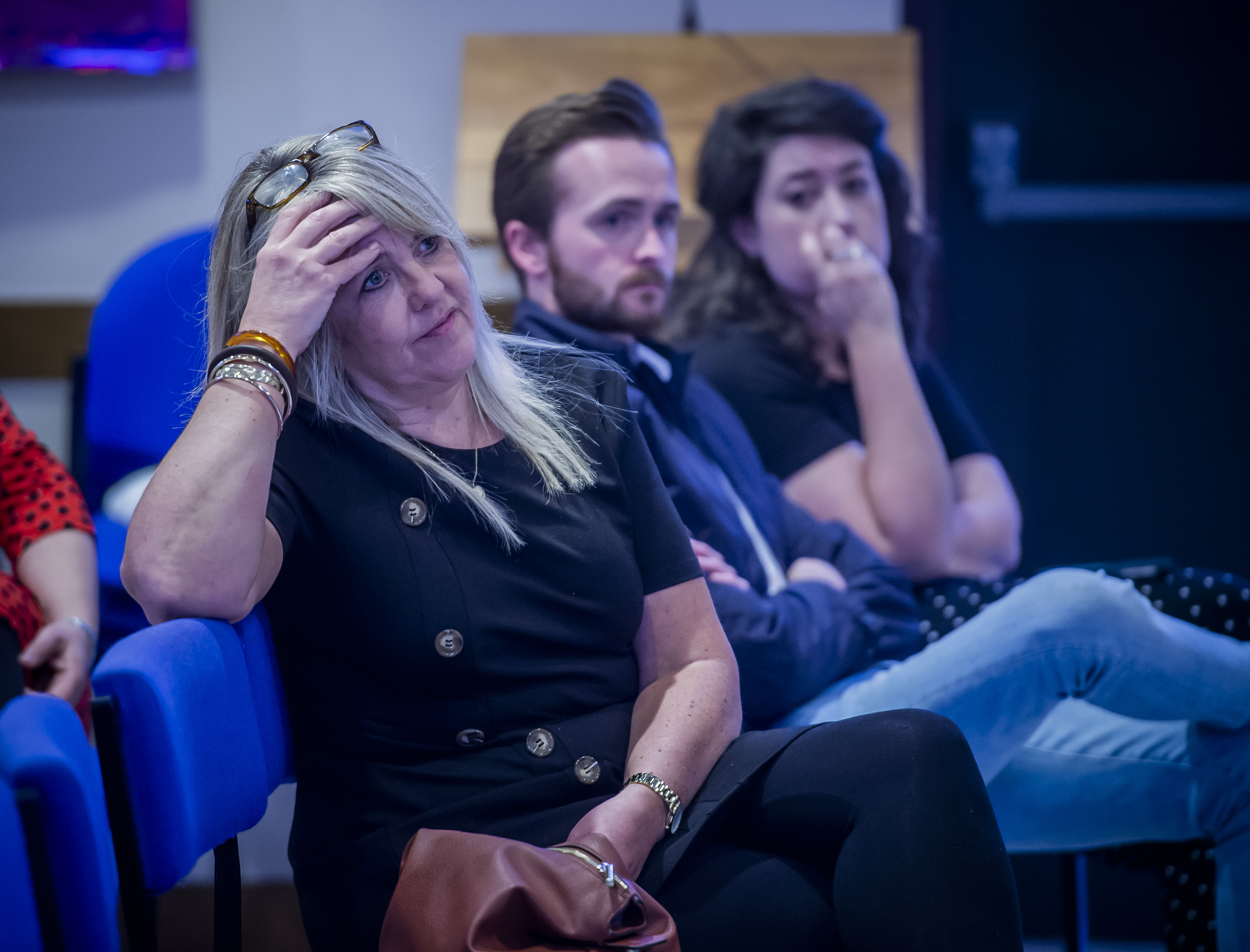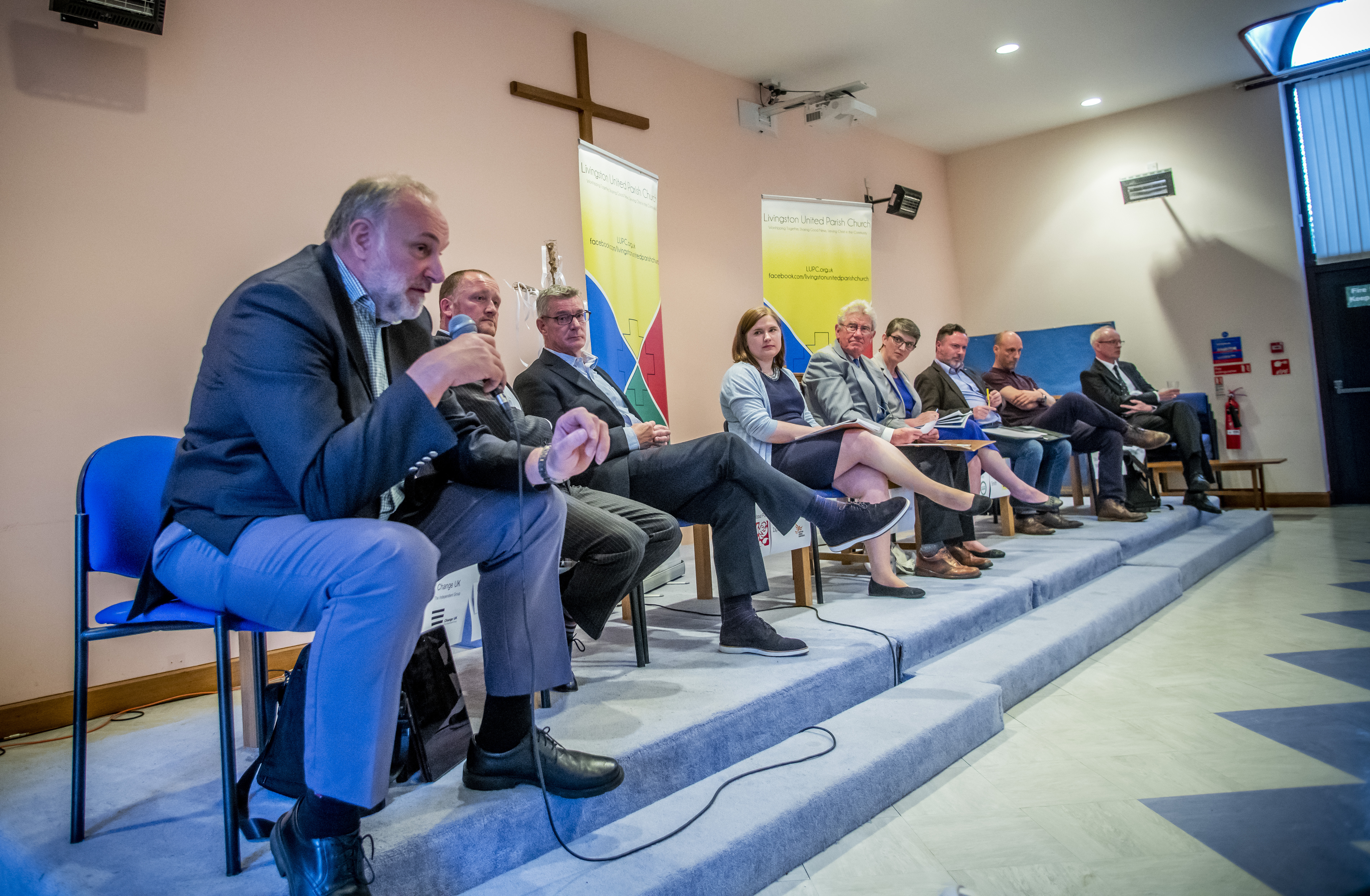
It was a day of sweltering temperatures, the hottest of the year, a time for barbecues, paddling pools and ice cream.
For 50 or so dedicated voters, however, the evening belonged to Brexit, a bit of a barney and a nice plate of biscuits.
The small but stringent audience congregated in a church hall in Livingston on Wednesday to quiz candidates from all eight parties taking part in the European Parliament elections.
As teas and coffees were served ahead of the hustings, it had the atmosphere of a regular meeting of worshippers – with little sign of the heated political arguments to come.
Steve Egan, 65, was one of about 50 people who ventured out to hear what the politicians had to say ahead of the elections taking place on Thursday.
He said: “I was quite surprised to see how many candidates were standing.
“I am very much a leaver but, to be honest, remain is a better option than the deal currently on the table.”
He also expressed concern that most of those attending the event were the older age category.
He added: “If you look at the age breakdown of the people here, there is not very many younger people, which is always the worry.”
Questions were submitted by the audience ahead of the meeting, which was organised by Livingston United Parish Church as part of their work in the community.
The first issue of the night, on whether there should there be a second EU referendum, soon revealed an audience as divided as the politicians seated in a row on a stage before them.
A rippling of applause came when Conservative candidate Iain McGill railed against the criticism of those who voted for Brexit as “offensive and dangerous”.
Minutes later a call from the SNP’s Alyn Smith to revoke Article 50 or, failing that, hold a People’s Vote was also met with enthusiastic clapping.
One man in the audience said revoking Article 50 would be the political elite “taking over and ignoring the people”, while another said he voted to leave – but felt he had not been informed of the facts over Brexit.
However the first real clash took place not over Brexit, but over the issue of Scottish independence.
An audience member stood up to criticise those who backed Scotland leaving the UK “on the basis of oil at over $110 a barrel and they don’t regret that at all”.
He was met with heckling from the room of “this is not about independence, this is about Brexit”.
Around half an hour in, the hustings were taking on a distinctly more heated tone. Stuart Waiton, the candidate for the Brexit Party, was met with cries of “untrue, untrue” when he claimed the EU is a “profoundly anti-democratic institution”.
And laughter greeted Labour candidate David Martin, the UK’s longest-serving MEP, when he said the Brexit referendum was about trying to hold the Conservative Party together, adding: “That went well, didn’t it?”
The chair of the hustings, Edward Idle, a church member who carried out the unenviable task of keeping eight politicians under control with the assured ease of a Question Time host, moved the debate on as it began to look like descending into a Remainer versus Leave rumpus.
He told the panel: “If you would like to have a fight in front of us, we would be very happy to watch that.”
The concerns of the audience were not just about constitutional matters.
When the parties were quizzed on their manifestos for the election, one of the biggest cheers of the night was for Green candidate Maggie Chapman’s call to tackle climate change, which she said was “humanity’s greatest crisis”.
A question on how parties who are the same side of the Brexit divide could be differentiated from each other prompted a tricky moment for Change UK. That morning, the party’s lead candidate, David Macdonald, had announced he had quit to endorse pro-EU rivals the Liberal Democrats.
Vita Zaporozcenko, the LibDem candidate seized the opportunity for a dig when she said: “We had a wonderful press conference this morning at which the lead candidate for Change UK explained exactly what the difference is.”
Change UK’s candidate Peter Griffiths responded by quipping: “We are always quite happy to change our number one when he is not suitable.”
The topic of immigration was put on the agenda when a woman in the audience asked how the “richness and talent” of people from the EU would be replaced in Scotland after Brexit.
Otto Inglis, the UKIP candidate, was keen to mention his Japanese wife as he outlined his party’s desire for a points-based immigration system which he said would be “open to the world rather than Euro-centric”.
The first booing of the night came when the Conservative’s David Martin called for Nicola Sturgeon to “get on with the day job” when talking about independence.
There was a sense of growing anger in the audience. One man talked of austerity, increasing poverty and a rise in the working poor in the UK.
“Why are we trying to commit economic suicide leaving the EU?” he asked.
The chairman had to call for order amid angry shouts after LibDem candidate Ms Zaporozcenko disputed there was a mandate for a second referendum on Scottish independence.
A furious woman in the audience also criticised the pro-Leave candidates saying it was “disgraceful” they were standing, despite not believing in the EU.
Two and a half hours and much discussion later, there had been time to answer just four questions submitted in advance by the audience.
The simple message from the chairman, as he summed up the evening, was to implore the audience to “use your vote”.
Michael Hibbert, 36, who was attending his first hustings, said it had been a useful experience. He said: “At these events you get to see the strength of the parties – there is no depth to some of the parties and it becomes evident when weaker candidates get to stand.”
A woman from Livingston, who declined to give her name, was also attending her first hustings – at the age of 67. She said: “I was hoping to learn a bit more about each party, but the questions that were asked, they have not actually been answered. Believe it or not, I don’t actually like politicians. I hate and detest lies and deceit.”

Enjoy the convenience of having The Sunday Post delivered as a digital ePaper straight to your smartphone, tablet or computer.
Subscribe for only £5.49 a month and enjoy all the benefits of the printed paper as a digital replica.
Subscribe © Alan Peebles
© Alan Peebles © Alan Peebles
© Alan Peebles